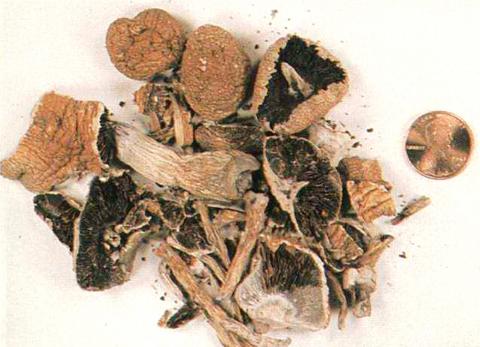Authorities have issued a warning after “magic mushrooms” were found growing at a popular pasture in Yangmingshan National Park (陽明山), saying the fungi are classified as a “Category 2” illegal drug.
Taipei’s Seventh Special Police Corps (保七總隊), in charge of public safety at Yangmingshan park, said they were alarmed at the discovery of “magic mushrooms” and have beefed up patrols in the park, which is frequented daily by city residents, hikers and tourists.
“We are paying close attention to this case and a team was dispatched this morning to collect the mushrooms. They will be sent for lab analysis,” said Wang Chi-cheng (王志成), head of the criminal investigation unit at the Seventh Special Police Corps.

Photo provided by the Criminal Investigation Bureau
“Before making a proper identification, we have reinforced patrols throughout all areas of Yangmingshan,” Wang told reporters.
The beefed-up patrols are needed because authorities have become aware of reports of the mushrooms creating a buzz both online and off the Web, mostly due to unfamiliarity and curiosity about this particular wild fungus with hallucinatory and psychedelic properties, Wang said.
According to a Chinese-language Apple Daily report on Monday, a man from Taipei surnamed Huang (黃) last month went to park’s Qingtiangang (擎天崗), a scenic mountain pasture still used by local farmers to graze cattle.
Huang said he found wild mushrooms, mostly white in color, growing on the cow dung. Thinking they were edible, the 24-year-old picked a bunch and took them home. He made a vegetable stir-fry with the mushrooms and consumed the dish.
Huang recalled that he began to experience something unusual.
“I felt light, like my body was floating in midair. I saw strange things and space seemed distorted. I also had this uncontrollable drooling,” he said, according to the newspaper report.
After coming down from the hallucinatory trip, which lasted about two hours, Huang was frightened and told a friend about the experience, who was certain Huang had eaten “magic mushrooms.”
According to experts, Huang had eaten psilocybin mushrooms, which contain the active ingredients psilocybin and psilocin.
Chen Chi-chen (陳啟禎), a biology professor at Southern Taiwan University of Science and Technology, said some indigenous people of central America used psilocybin mushrooms to induce psychedelic experiences during traditional ceremonies and religious rituals.
“In this case, the mushroom spores were eaten by cattle and expelled in their feces. When suitable temperature and humidity conditions were met, they sprouted on the dung and grew into mature mushrooms,” Chen said.
“They can also grow on other cool and wet mountain slopes around Taiwan, not just on Yangmingshan,” he added.
On Tuesday, the Food and Drug Administration issued a statement warning the public not to pick any wild mushrooms found in mountainous areas and not to eat them.
“Psilocybin mushrooms affect the central nervous system, lead to muscle weakness, and may cause convulsions and lead to death in serious cases,” the administration said.
The statement stressed that psilocybin mushrooms are illegal in Taiwan, as they are considered a “Category 2” drug, alongside marijuana and amphetamine.

A preclearance service to facilitate entry for people traveling to select airports in Japan would be available from Thursday next week to Feb. 25 at Taiwan Taoyuan International Airport, Taoyuan International Airport Corp (TIAC) said on Tuesday. The service was first made available to Taiwanese travelers throughout the winter vacation of 2024 and during the Lunar New Year holiday. In addition to flights to the Japanese cities of Hakodate, Asahikawa, Akita, Sendai, Niigata, Okayama, Takamatsu, Kumamoto and Kagoshima, the service would be available to travelers to Kobe and Oita. The service can be accessed by passengers of 15 flight routes operated by

Alain Robert, known as the "French Spider-Man," praised Alex Honnold as exceptionally well-prepared after the US climber completed a free solo ascent of Taipei 101 yesterday. Robert said Honnold's ascent of the 508m-tall skyscraper in just more than one-and-a-half hours without using safety ropes or equipment was a remarkable achievement. "This is my life," he said in an interview conducted in French, adding that he liked the feeling of being "on the edge of danger." The 63-year-old Frenchman climbed Taipei 101 using ropes in December 2004, taking about four hours to reach the top. On a one-to-10 scale of difficulty, Robert said Taipei 101

MORE FALL: An investigation into one of Xi’s key cronies, part of a broader ‘anti-corruption’ drive, indicates that he might have a deep distrust in the military, an expert said China’s latest military purge underscores systemic risks in its shift from collective leadership to sole rule under Chinese President Xi Jinping (習近平), and could disrupt its chain of command and military capabilities, a national security official said yesterday. If decisionmaking within the Chinese Communist Party has become “irrational” under one-man rule, the Taiwan Strait and the regional situation must be approached with extreme caution, given unforeseen risks, they added. The anonymous official made the remarks as China’s Central Military Commission Vice Chairman Zhang Youxia (張又俠) and Joint Staff Department Chief of Staff Liu Zhenli (劉振立) were reportedly being investigated for suspected “serious

Taiwanese and US defense groups are collaborating to introduce deployable, semi-autonomous manufacturing systems for drones and components in a boost to the nation’s supply chain resilience. Taiwan’s G-Tech Optroelectronics Corp subsidiary GTOC and the US’ Aerkomm Inc on Friday announced an agreement with fellow US-based Firestorm Lab to adopt the latter’s xCell, a technology featuring 3D printers fitted in 6.1m container units. The systems enable aerial platforms and parts to be produced in high volumes from dispersed nodes capable of rapid redeployment, to minimize the risk of enemy strikes and to meet field requirements, they said. Firestorm chief technology officer Ian Muceus said